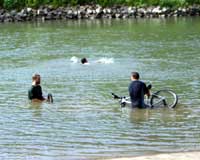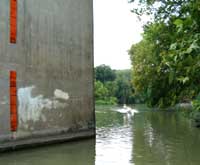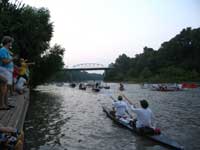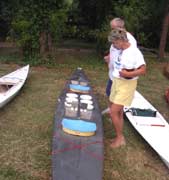
Colorado River 100 mile Canoe Race
3 Views
Sandra Leinweber - John Wright - Chuck Leinweber
NOTE: a few days ago we posted what can be considered the fourth view of the race. That was Skip Johnson's critique of the boat he built and he and I paddled in the race. We thought it would be entertaining and informative to post these three narratives of three more distinct versions of what was essentially the same event. |
Sandra Leinweber
Chuck and I had never done anything like this. My part seemed simple. Help Skip’s wife Susie take water and food and ice and whatever else to the 3 checkpoints along the 100 mile course down the Texas Colorado River. Chuck’s part, not so simple. Climb aboard the boat that Skip designed and built, paddle approximately 1000 strokes per mile for hopefully no more than 20 hours, and live to tell the tale.
|
|
Paddlers struck me as a calm bunch; business-like in the still dark morning at Fisherman’s Park in Bastrop, TX. |
|
Paddlers struck me as a calm bunch; business-like in the still dark morning at Fisherman’s Park in Bastrop, TX. One by one, they carried their various boats down to the water. I heard bits and pieces of strategy. “a steady pace will win the race” “I like to get ahead and stay in front” “drink at least a quart an hour of water with electrolytes” “it’s not about winning, it’s about having fun”. The first group to leave at 7am was the solo adventure class, about 20 boats. Among them was John Wright, whom we first met at the last Duckwork’s Messabout. He built a new boat specifically for this race. (photo) The whistle blew and they were off. Chuck and Skip were in the second group, the tandem adventure class, and with almost 40 boats, the largest group, and their whistle blew at 7:10. Later that morning, at 10 and 10:10 respectively, the serious racers would take off. I assume the idea was to keep the adventure group from feeling hopelessly left behind as the more competitive folks (they got prizes) whizzed past and out of sight.
Susie and I had a 20 minute drive to Smithville. With luck and steady work, Chuck and Skip would arrive there sometime between 11 and 11.30, 25 miles down the winding river. Once there, we settled down to wait with all the other support teams. One family brought fishing rods to pass the time. At some point 2 fellows on bikes rode down the ramp and straight into the water where they proceeded to wash their bikes and cool down. A group of high school boys arrived in mass and stood lookout talking about “Coach”, wondering if he would arrive first. Susie crocheted, I read, we visited, and the time passed slowly.
At some point 2 fellows on bikes rode down the ramp and straight into the water where they proceeded to wash their bikes and cool down. |
 |
|
“Boat!” I was going to hear that cry over and over, and it was exciting every time. The first paddler to arrive was a solo. Volunteers held his boat while he went to get his card punched. His support team refilled his liquids, checked his gear and gave him a long ice filled cooling sock to hang around his neck. It was just a like a pit stop in a car race except there was no oil to check, no tires to change. Minutes later, he was off. We did not keep count, but it was not too long before Chuck and Skip arrived, still in fighting form. We did our thing (lets just say Susie knew just what to do, and I got better on the second stop), and they were gone. The second leg was 17 miles, down to Plum Park on the Colorado.
The LCRA (Lower Colorado River Authority) has 40 parks, recreation areas, and preserves along the river from Lake Buchanan to Matagorda Bay, about 16,000 acres total. Some, like Plum Park are minimally developed with a few picnic tables and pit toilets. Others have electricity, RV sites, showers, etc. All offer the public access to the river, since most of the river frontage is privately owned.
It was a dark and stormy night. I wish. It was a hot, humid day—not as hot as it could have been since there were some clouds and a bit of breeze. We sat under the trees with everyone else and waited. Spirits were good despite the heat and the slow march of time. Some of us splashed in the river. Three hours after leaving Smithville, the first boats began to appear. Mostly businesslike, they went through the resupply routine and departed. Some were slower to depart, spending time just lying in the water to reconstitute. “Coach” came into sight, and his crew met him out in the water. Maybe thirty minutes later, our guys arrived. I spotted them a ways off; Chuck’s paddle has white blades that flashed in the sun, and they were both wearing the slick white shirts that keep you cool by wicking the sweat away from your skin. They sat in the water to rest and rehydrate a bit while we refilled their jugs and heard about the checkpoint they had missed. There are 12 checkpoints along the way, some on land, some on the water, each with a different paper punch—a distinctive shape that goes in a certain square on the paper carried in each boat. A missed one means a time penalty at the end. If you miss one, you don’t go back, the current makes it too hard.
|
|
It was a hot, humid day—not as hot as it could have been since there were some clouds and a bit of breeze. We sat under the trees with everyone else and waited. |
|
And they were off. 17 river miles to La Grange. Susie and I were in separate cars, and she was planning to make a pit stop at the kolache shop just outside La Grange. Driving down the highway, I kept thinking I had forgotten something. Ice. Chuck’s ice filled sock was still in the ice chest. Boy, did I feel dumb. My only consolation was that he had forgotten too. He had a much better excuse than I did, something like 42 miles of mind numbing repetitive motion for 7 hours. When Susie and I met at La Grange, and I told her, she made me feel better. Then she opened her ice chest, and Skip’s sock was still there too! A warm soft piece of apricot kolache made me feel much better. Nothing we could do but do better next time.
Another long wait. La Grange was the last spot we could meet the boats. The longest section of the race was still to come, the almost 40 miles to the finish, much of it in the dark. We were beginning to see new support teams, and soon we would see some of the fast boats, the real racers, the competitors who had begun 3 hours later than Chuck and Skip. They were averaging close to 8 miles an hour. Some would probably finish in under 15 hours.
Chuck and Skip were slowing down a bit. We started looking for them 3 hours after they left Plum Park, but it was 3-1/2 and a bit before they pulled in. |
 |
|
Chuck and Skip were slowing down a bit. We started looking for them 3 hours after they left Plum Park, but it was 3-1/2 and a bit before they pulled in. My first inkling that Chuck had doubts about finishing was when he quietly asked me if Susie had said anything about Skip saying anything about the possibility of only going to La Grange.
“No.”
He did not want to disappoint Skip, but he clearly had doubts about the next 8 or 9 hours, traveling in the dark, tired and somewhat fuzzy. I told him he should trust his instincts, so he talked to Skip. They decided to wait 20 minutes and see how he felt. Twenty minutes later, he felt the same and more so. Bless Skip, he accepted being done with a smile. He felt they had done every bit as well time wise as he had hoped. The boat had performed well. Skip is 62 and Chuck is 56 , and they had traveled 63 miles in 11 hours, all under their own power. I am still amazed.
I confess to relief. I would not have to worry about them plummeting downstream in the dark. They had lights, but the current can take over control in an instant, especially when you can’t see all around you. Snags and rocks are hard to spot. I would not have to think about the required plastic name tags every paddler wore around wrist or ankle just in case.
We did a reverse of the start, unloaded the gear and put the boat back on Skip’s rack. Skip was staying to discuss a boat he would be designing for a fellow watching the race. We headed for our daughter’s house in Austin, closer than home, with only a stop for a diet soda, Chuck saying he never wanted to taste Gatorade again. Then he said maybe he would if the next race was just a bit shorter.

John Wright
Yesterday, I started the Colorado 100 which was, by itself, an accomplishment considering I was not able to prepare or condition for the race. I was on crutches, and in a bad way, for three of the four weeks prior to the event.
The first section was 25 miles from Bastrop to Smithville which I completed in 5 1/2 hours including two stops at check points where you have to get your "passport" punched. That is an average of 4.545 mph which means that, while paddling I
averaged about 5 mph. Six days before the race I was finally able to get in
the boat and was only able to do that 25 miles it in 6 1/2 hours and was totally exhausted. The one hour improvement was huge. Point, a little practice and conditioning does a lot of good. Perhaps a lot of practice will do a, lot of good?
|
|
I was very pleased with my low, light and lean 16' kayak, Palindrome. The word kayak can be spelled backwards and it still spells the same! A palindrome. It was light and fast and the steering worked well. |
|
The time limit (cutoff) for that first section was 6 hours. I question that I could have made the next cut off time 35 miles down the river at the mandatory second check point at La Grange, I was tired. I had never paddled that section and it would have been dark, with no moon, by the finish of that section and at that time and my left elbow was hurting and I think someone would have had to lift me out of the boat, if I had made it that far. Too humiliating to contemplate. I still do not know what I am capable of. With a minim of 3 or 4 months of serious conditioning and or practice three times a week, what would I be able to do?
What I learned! Toward the end of that 5 1/2 hours I discovered a "zone" where I was able to totally concentrate on the paddling stroke and focused on the entrance of the paddle into the water. The hazard in that, I discovered, is that I was not attentive to the approaching fast water, rapids and just simple steering, but I think that could be incorporated into the "zone" producing a 6 mph pace, which is, I think necessary for the successful completion of this event.
This is a relatively safe portion of the river but the kayak in front of me capsized when the current pulled him into a tree, about 500 yards from the start! Did you know that bananas float in the water? And, they were very tasty! This is not an event for the "recreational" paddlers that just intends to keep the boat moving. Chuck Lineweber and Skip Johnson, in Skip's 24' skin on frame kayak, started 10 min. after us singles and they passed me within about 30 min., going really fast. They were in about second or third place, at that point, I think. Fascinating boat! Magic! I was very pleased with my low, light and lean 16' kayak, Palindrome. The word kayak can be spelled backwards and it still spells the same! A palindrome. It was light (29 LB complete) and fast and the steering worked well. The only weakness in it's performance, was it's marginal crew. Hmmmmm, how about a "skin on frame" PDRacer! What is next? The Water Tribes Everglades Challenge? It's only 300 miles with no sleep! Should I try it single or tandem? Damn, this retirement stuff, is fun!

Chuck Leinweber
Ok, I admit it. I wanted to paddle past all those other boats. I wanted to see the looks on their faces. Sandra and Susie kept saying,
“Get out in the river! You’ll miss the start!”
I played dumb. Suddenly the horn went off, and all forty some boats left the starting line in something like determined panic. As soon as there was room, Skip and I got on our boat and left too.
I played dumb. Suddenly the horn went off, and all forty some boats left the starting line in something like determined panic. As soon as there was room, Skip and I got on our boat and left too. |
 |
|
This was lots better than the two twenty-odd mile practice runs we had made on the course. There were boats on the left and boats on the right. It was like a big party on the water. Slowly, we worked our way up through the crowd until there were only four or five (that we could see) ahead of us.
Soon we began passing the single boats that had left 10 minutes before us.
“Hi”, we called. “Nice day for a paddle, eh?”
Everyone nodded or said “Beautiful”.
We passed John Wright (see story above) in his nice little home built canoe. This guy really has a lot of grit. We caught up with Gerald Kennedy, a skilled canoe and kayak builder and organizer of the Texas Kayak Builder’s Bash. He was moving along having a great time.
After a while we were in a kind of groove. Stroke, stroke, stroke.
“Don’t forget to drink”, Skip said. “You need to drink a quart an hour.”
Skip had some foul tasting electrolyte stuff that was supposed to keep you hydrated, but I was better able to drink Gatorade. It’s not easy to force yourself to drink when you aren’t really thirsty. But we did Ok; after all, we had practiced this.
Eight or ten miles down the river we found our first checkpoint. We had a card with a dozen spaces that had to be punched with each one of the 12 punches that were located along the course. The first one was easy. There were about six or eight boats in the process of coming and going and punching. Skip punched while I adjusted the GPS.
We weren’t quite as athletic as some of the kids there and ended up behind a few of the boats we had passed earlier. So we just passed them again. It takes a long time to pass a boat when you are a quarter mile behind and only gaining by half a mile per hour.
Then when we had almost caught them, there was a fork, an island. An aluminum canoe two boats ahead went to the left, but the boat in front of us went right. We followed them. Big mistake. It was shallow, twisty, with overhanging branches – in short, slow. When we rejoined the river, the aluminum canoe was gone. That must have made an impression on the boat we were about to catch, because they put on the speed and inched ahead of us until they were also out of sight. I muttered,
“Who are those guys anyway?”
Around the bend came the high sandstone cliff. I knew from practice that we were close to Smithville. The GPS said two more miles. That was a long two miles, but not as bad as the first time we did this stretch a few weeks back. I remember I was thinking that this was insanity. Who does this for fun? My back hurt, my legs hurt, my butt hurt, my arms hurt. I said,
“Skip, we’ll never get there.”
He said,
“We will get there in the fullness of time.”
But that was then - this was now. I felt great! Not much pain at all. We came around the bend, and there was a big crowd of supporters yelling and looking for their guys.
|
|
I felt great! Not much pain at all. We came around the bend, and there was a big crowd of supporters yelling and looking for their guys. |
|
Sandra and Susie are right there and all organized. We get water, ice in socks and attaboys. Skip mixes more of his so called drink, and I mix Gatorade. I eat a snack bar. Then we are off. 17 miles to Plum Creek, the next checkpoint. Nothing to it. The sun has come out, and it is getting a little warmer. A week ago they were predicting 100 degree temps for today, but now clouds are forming. It will rain this afternoon.
It’s warming up now. The sock-stuffed-with-ice necklaces feel great. I put my sunglasses on. We get back in the groove. Stroke, stroke, stroke. My butt is beginning to hurt, so I stretch and try to change positions a little bit.
We get close to the next checkpoint. The GPS puts us within 50 feet or so, but we don’t see it. It’s supposed to be river right, but there is an island so we take the right channel. When we come out several hundred yards later, a boat hails us,
“Did you see the checkpoint?”
It was on the left side of the island. Too late to go back now. Bummer. Each missed checkpoint adds an hour to your time.
Approaching Plum Creek, we get close to a plastic kayak with two young girls in it. They are chatting away like they were on their way to the mall. There is a small island, and the boat ahead of them goes right, and they go left.
“Which way?” Skip asks.
“Take your pick”, I reply, but I don’t have a clue. I’m new at this. We follow the girls. Wrong again. They end up on a gravel bar and have to get out and pull the boat. So do we. Later in clear water, we catch them. They are almost giddy.
“You led us astray!” we complain.
“Yes”, they say, “But we don’t know what we are doing. We have never done this before.”
This after 35 miles of paddling! I tell you youth is wasted on the young.
Finally. Plum Creek. It’s a wide spot in the river. If it weren’t for all the support people waiting there, you would not even know it was a park. We pull in and plop in the water to cool off. I’m a little unsteady on my feet, and Susie asks me if I’m Ok.
“I’m fine”, I say. “Just a little stiff.”
One guy is out in the middle of the river. Sandra says he was the first one there, and that he has not moved for 30 minutes. He is just lying in the river enjoying the cool water. Most of the boats zip in, get water and get right back on the river. There are some pretty determined paddlers. We are not all that determined. Skip seems delighted with out speed which is over 6 miles per hour at this point.
We say our goodbyes and head for La Grange, less than 20 miles downriver. Now my butt and back really start to hurt. My hands are sore too in spite of gloves. It’s been a long afternoon. It’s hot, although it does rain just a bit. We suddenly realize that we did not get our ice necklaces at Plum Creek. We aren’t making the same speed we were. We stop to pee and two boats pass us. Who are those guys anyway.
“Skip”, I exclaim “We will never make it.”
“Yes we will”, he says.
I add, “I know – In the fullness of time.”
Suddenly a big snag in the river seems to be coming right at us. “Skip!” I yell.
“Paddle right!” he hollers. We barely miss it.
“I guess I wasn’t paying attention”, he says.
Back to paddling. Stroke, stroke, stroke. It never ends. I think I’m getting blisters on my palms. I don’t need that. I start to think about nightfall. More snags. We have cool headlights, but will they work under water? What if a snag comes up, and we don’t miss it? What if we dump the boat and lose contact with each other? What if we get a hole in the boat and the bilge pump batteries run down? What if we lose a paddle in the dark? It’s 40 miles from the next pit stop to the finish. 8 hours at our current speed. It will be dark, and we are tired. Our judgment is impaired. Our reflexes are compromised. Our wives will worry about us.
I can’t quit! Skip deserves better than that. He and Susie have worked really hard and taught me a lot. I am probably in better shape than I have been in since college. How can I be such a weenie? |
 |
|
I can’t quit! Skip deserves better than that. He and Susie have worked really hard and taught me a lot. I am probably in better shape than I have been in since college. How can I be such a weenie?
What about pros and cons: What is the best that can happen? We finish the race in 10 place or so. The worst? I don’t want to think about it. I look down at the ankle tag with my name on it. They tag every paddler just in case.
Stroke, stroke, stroke. It’s not fun any more. I’m dead tired. Don’t want to take by gloves off and look at my hands. I’m through. We finally get to La Grange, and I tell Skip,
“I don’t think I can go on.”
“Lets wait 20 minutes and decide,” he says.
I know he wants to go on and I feel terrible doing this to him. Twenty minutes later he comes over, and I shake my head. He smiles and says,
“No problem. I’m thrilled with the performance of the boat and we had a great day.”
I wanted to kiss him. It takes a heck of a big guy to let you out of a commitment and make you feel good about it. Thanks, Skip. Like those girls would have said “you da bomb”.

